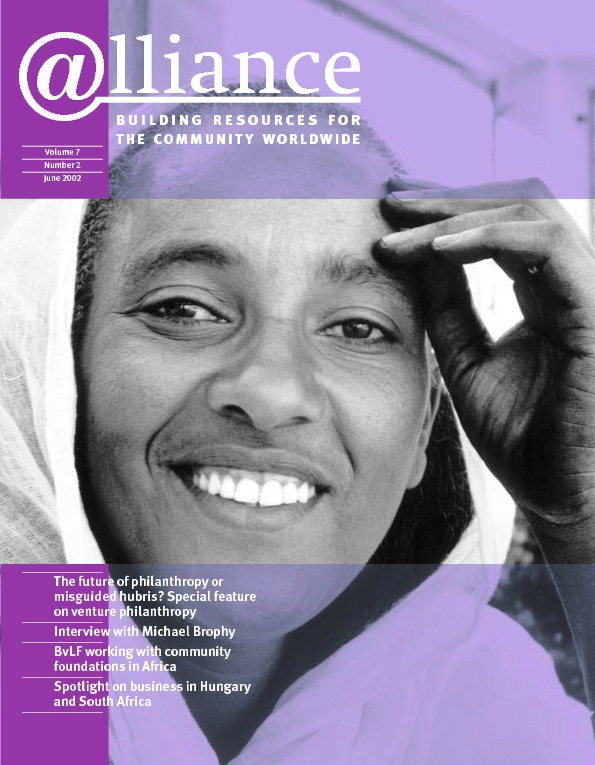‘We cannot do it alone. We must engage the private sector and foundations to work together and maximize each others’ comparative advantages to help developing countries come out of the poverty trap.’ So said UN Secretary-General Kofi Annan when he took office in 1997. The United Nations Fund for International Partnerships (UNFIP), established to serve as the interface between Ted Turner’s United Nations Foundation (UNF) and the UN family, has also been spearheading the move to form new UN partnerships with corporations, foundations, individual philanthropists, NGOs, and bilateral and multilateral donors.
In 1997, businessman and philanthropist Ted Turner made headlines internationally when he announced an unprecedented gift of $1 billion in support of UN causes. In less than five years, this gift has achieved results in 120 countries and served as a catalyst for a major expansion of UN partnerships with the business sector and private foundations.
UNFIP serves as the focal point in the UN system for the Turner initiative. As such, it works closely with UNF and UN agencies in identifying innovative, high-impact projects and oversees the channelling of UNF funds into the UN system.
UNF achievements
The Turner initiative supports the UN in four key areas: children’s health; women and population; the environment; and peace, security and human rights. In each of these areas, projects have achieved dramatic early results, including significant progress towards eradicating polio by 2005[1] and concrete action to eliminate and control invasive species in the Galapagos. To date, 224 projects, totalling $424 million, are being implemented with 30 UN entities and over 35 partners, such as the UK Department for International Development, Fauna and Flora International, Deutsche Bank and many others.
An important and often less recognized by-product of this visionary initiative by Ted Turner has been the heightened interest this has generated in the plight of the underprivileged in developing countries.
Working with the private sector
It is clear that the intellectual leadership and resources of companies and foundations can provide tremendous added value to the UN’s work. It is no coincidence that of the four new initiatives put forward in the Secretary-General’s Millennium Report of September 2000, three call for direct engagement of the private sector.
UNFIP’s partnership-building role involves highlighting the comparative advantages of UN organizations and facilitating joint efforts with the private sector. A good example is the
UNAIDS partnership with the Coca-Cola Company, which uses the latter’s vast logistical infrastructure for advocacy on HIV/AIDS and other diseases and for the distribution of vaccines and supplies to remote points of Africa. UNFIP and Coca-Cola are also exploring new ways of energizing private sector networks, like the national and international Chambers of Commerce, and individual companies to work on UN causes at the field level.
Working with foundations
Alliances are increasingly being set with foundations too. In the US, despite a solidly established culture of philanthropy, it is only recently that international issues have begun to be seriously looked at by leading philanthropists, including Ted Turner, Bill Gates and George Soros. The Bill and Melinda Gates Foundation is now a major contributor to fighting disease and bringing health care to the world’s poorest children.
One innovative initiative worth highlighting is the Rockefeller Foundation-led Mother-To-Child-Transmission (MTCT) Plus initiative, which focuses on HIV/AIDS prevention linked to treatment so as to increase survival of both infected mothers and their babies. The Plus element aims to make available low-cost, or no-cost, drugs, with the generous support of a number of pharmaceutical companies. This $100 million programme will be implemented, among others, by UNICEF and the Elizabeth Glaser Pediatric Aids Foundation. The initiative, supported by a coalition of foundations,[2] will be administered by Columbia University’s Mailman School of Public Health.
In Europe and other high-income countries, philanthropic engagement for international causes has remained limited. Nor has the international community adequately involved philanthropists in low-income countries in meeting development goals.
As a facilitator, UNFIP will continue its attempts to forge new partnerships throughout the world in the hope of collectively making a difference.
1 A collaborative initiative involving WHO, UNICEF, Rotary International, the Bill and Melinda Gates Foundation and UNF.
2 The initiative is currently being supported by a coalition of nine foundations: Bill and Melinda Gates, William and Flora Hewlett, Robert Wood Johnson, Henry J Kaiser Family, John D and Catherine T MacArthur, David and Lucile Packard, Rockefeller, Starr, and UN Foundations.
Amir A Dossal is Executive Director of UNFIP. He can be contacted at info-unfip@un.org


Comments (0)